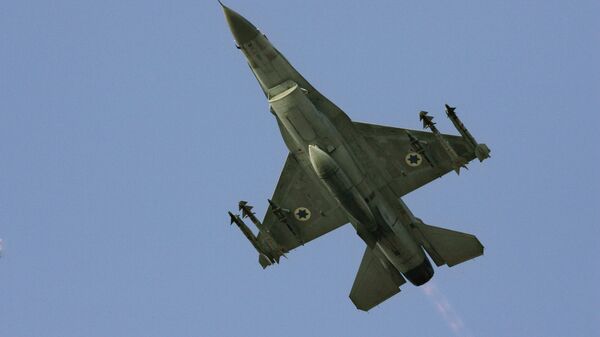Israel's new tactics were detailed in a Wednesday statement by the Russian Defense Ministry, which indicated that six Israeli F-16 fighter jets used two commercial aircraft as cover that were preparing to land in Damascus and Beirut, respectively.
Photos since released by the Israeli company ImageSat map out a 900-square-meter area where strikes reportedly destroyed an arms depot that was housing Iranian weapons. Wednesday's airstrike came after Israeli Prime Minister Benjamin Netanyahu vowed to continue military operations in Syria to counter Iran's military presence.
"It shows a new modus operandi that the Israelis are no longer [as] fearless as they were of their planes being brought down," Ford told Sputnik Radio's Loud and Clear on Thursday.
"Because, thanks to the Russians, the Syrian Army now has improved anti-aircraft defenses, therefore the Israelis are using new tactics, and it appears one of these is to hide behind other aircraft."
As Ford notes, this wasn't the first time that Israel has used such measures to initiate its strikes on neighboring Syria. Earlier this year, in September, Israel was accused by Russia's Ministry of Defense of using one of its aircraft as a shield against Syrian anti-aircraft systems. However, unlike the Wednesday strike, the September airstrike on Syria turned fatal as a Russian recon aircraft carrying 15 servicemembers was destroyed by Syrian anti-air fire aimed at the Israeli jets.
Considering both operations, Ford told hosts Brian Becker and John Kiriakou that new rules of engagement were coming into play for Russia as a consequence of Israel's misstep. "They have effectively taken their Syrian partners off the leash and are saying to the Israelis that the ‘Syrians, if they can manage it, will take down your aircrafts. Don't look to us for any kind of protections,'" he said.
Looking ahead, and taking into consideration the United Arab Emirates' announcement that it would be reopening its embassy in Syria, Ford suggested that the move would pave the way to normalizing ties between Syria and the UAE's close ally, Saudi Arabia, which has supported anti-government forces in Syria's 7-year-long civil war.
"It's just a matter of time before the Saudis resume relations, and before Syria is readmitted to the Arab League," he said.


